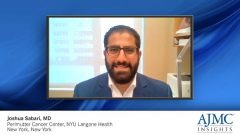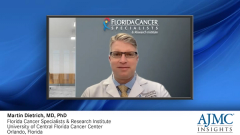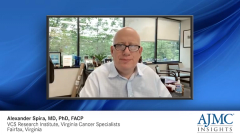
NSCLC Molecular Testing: Part 1
Alexander Spira, MD, PhD, FACP provides an overview of molecular testing in NSCLC.
Episodes in this series

Alexander Spira, MD, PhD, FACP: Guidelines and recommendations around molecular testing in advanced non-small cell lung cancer are to test every patient with a full NGS [next generation sequencing] panel with advanced disease before they embark on therapy. Anybody with stage 4 disease or incurable non-small cell lung cancer should have a full genetic panel for all targetable mutations that there are FDA-approved therapies for, those that are emerging, and PDL testing. It's a little different than the rest of the world, [which] the rest of the world agrees with. Due to payer issues and cost of testing, not every country outside the United States is there, although many are. I firmly believe that everybody should be tested with a foreign NGS panel, [and guidelines support this].
There are a lot of different testing methods that are used to test for these molecular alterations in non-small cell lung cancer. You can do spot testing, where you pick the genes; unfortunately, with that, what ends up happening is you use of a lot of your cellular product, and you don't have enough to test for a broad base panel. More and more patients are getting full next generation sequencing panels, which could really look for up to 600 genes, but you get all the genes for the price of doing the actionable ones. That's important because there's obviously emerging therapies or clinical trials for our patients as well, which we can be testing for with this. There are 2 different methodologies using mRNA and using DNA. RNA has a [slightly] better profile, but not everybody uses that right now. RNA will pick up on things that are altered between the DNA level and the RNA level, which is important. There are some fusion products and other products that might not pick up on a DNA-based assay, so it's important to know. In terms of testing, there's 2 ways to look: one is by blood, so blood-based testing and liquid biopsies, and tumor testing. I do both. The classic way of studying this is using the tumor testing. Unfortunately, the specimens are sometimes inadequate. The challenge of liquid biopsies is they come back fast, so you don't have to worry about getting the tissue or anything like that. The limitation is it's not quite as good because it's really dependent on many things, but most importantly, how much cancer the patient has; the more cancer patient has, the more likely they are to pick up these mutations in the blood, so you don't know if it's not being tested. You don't know if the patient doesn't have it or if there's just not adequate DNA in the blood to pick it up.
I look for a full NGS panel. It allows for all the actionable mutations, as well as the emerging ones. I'm a huge advocate for clinical studies, especially those with targeted therapies, and there are emerging ones that are not FDA-approved right now. Three years ago, KRAS-G12C wasn't on anybody's radar screen. Now, it's great to know that you had a patient tested 2 years ago before the drugs were approved, and you have G12C mutation. I test everybody will full next generation sequencing panel.
The main barriers in testing are 2 things: time and tissue. One is that a patient may not have a great biopsy, and by the time they do the typical H&H [hemoglobin and hematocrit], you may not have enough. When the patient walks into your office, they've been caring and diagnosed as possibly having lung cancer for 2 or 3 months, and they're walking in today now with a new diagnosis of lung cancer. You need to talk to the patients about what the treatments are, but we're not going to treat them yet. We're going to wait for [the tests] to come back. The main barrier is getting the testing done in a timely fashion so there's a minimal wait, for 2 reasons. One is there are some patients who are symptomatic and can't wait for their NGS panel to come back. More importantly, it is a psychological aspect. We know you have lung cancer, but we're not going to come up with a treatment plan until we get everything back. While that's easy to say and easy to understand, if you're the patient sitting in front of you, that's got to be a hard thing to digest; if I have lung cancer, I want treatment.
This transcript has been edited for clarity.
Newsletter
Stay ahead of policy, cost, and value—subscribe to AJMC for expert insights at the intersection of clinical care and health economics.











